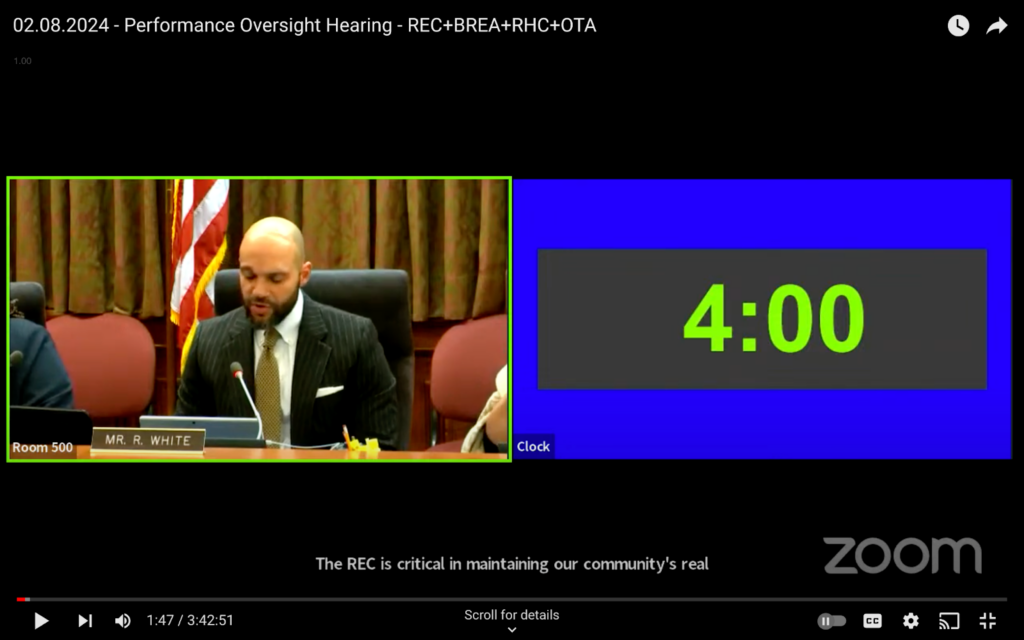D.C. community members and government officials testified before the Committee on Housing at an oversight hearing on Feb. 8, which aimed to evaluate the performance of the Office of the Tenant Advocate (OTA).
In 2023, amid soaring rent prices in D.C. and across the United States, the D.C. Council approved an emergency bill to cap maximum annual rent increases in rent-controlled units to 6%. This effort was partially spearheaded by Councilmember Robert White, who now chairs the Committee on Housing. However, residents and Chief Tenant Advocate Johanna Shreve argued the city could do more to protect affordable housing.
In a city where renters outnumber homeowners, rent control is critical in keeping housing affordable and maintaining housing security for the majority of D.C.’s population. Over the summer, both residents and councilmembers alike called for comprehensive reform.
During February’s hearing, trustee David Marlin, representing the Committee of 100 on the Federal City, urged the Committee on Housing to make structural reforms to the rent control statute to protect tenants and make it easier to expand rent control.
“It is a well-supported fact that the District needs more affordable housing to prevent the displacement of our working force,” Marlin said.
To that end, Marlin advocated for the repeal of two provisions of the rent control statute: voluntary agreements and certificates of assurance.
Both voluntary agreements and certificates of assurances have been subject to repeated moratoria over the last few years. However, two pending bills, introduced by Councilmember Anita Bonds and Councilmember Christina Henderson respectively, call for the permanent repeal of these provisions.
According to Marlin, both provisions have been a “poison pill” for the expansion of rent control.
Voluntary agreements allow landlords to increase rent beyond what is stipulated in rent control limits in exchange for offering upgrades to their buildings, as long as they have the approval of 70% of tenants. Critics of voluntary agreements, like Marlin, argue landlords often pressure tenants into signing these agreements, abusing this provision as a loophole to raise the rent of rent-controlled units.
Certificates of assurance, on the other hand, ensure landlords are compensated if their buildings are ever converted into rent-controlled housing for the difference between market rents and rent-controlled rent. To Marlin, this has the potential to drain D.C.’s coffers, diverting funds away from other crucial programs. In its four decades of rent control, D.C. has never granted a certificate of existence, despite an influx of applications in 2020.
Shreve, the head of the OTA, also spoke about reforms to rent control. Among other efforts in the past year, Shreve said that OTA contributed to the drafting of the emergency bill that capped rent increases and promoted provisions that would prevent landlords from overcharging tenants.
But Shreve shared concerns about continuing automatic rent increases for rent-controlled units, especially since many older buildings have faulty amenities. She suggested landlords instead build a mandatory replacement reserve fund, which would obligate landlords to pay for upgrades and improvements, as well as anticipated maintenance costs. Landlords could put any additional revenue from rent increases into the reserve fund.
“I think the automatic rent increase business needs to be rethought,” Shreve said. “Why are we as a city giving [landlords] an increase every year without justification?”
While residents all said D.C. should create more affordable housing, there was disagreement on the approach. Co-founder of Chevy Chase Voice Sheryl Barnes opposed Mayor Muriel Bowser’s plan to increase density in areas like Chevy Chase through adding more affordable housing. She instead suggested the city work to distribute its housing vouchers and fill vacant units.
The hearing also touched on what OTA can do to promote tenant rights.
A tenant group, the Tenant Advocacy Coalition (TENAC), pushed for more transparency on the OTA website so tenants could more readily navigate any difficulties with landlords and track potential policy changes.
“TENAC has long wanted an addition to the OTA website that would list current issues tenants face and reforms necessary to resolve these issues,” Robert Leardo, co-chairman of TENAC, said. “With such a resource, all stakeholders, the council, and its staff could be brought up to speed quickly on tenant legislation issues and needed reforms…It is vitally important tenants be well informed of the issues that affect the community.”
Leardo also proposed several policies he said would improve accountability for landlords and protect tenants from incurring avoidable costs, such as a repair and deduct law that has been successful in Massachusetts. Under such a law, tenants can make repairs and have repair costs deducted from their rent in the event their housing is in unhabitable condition and landlords refuse to make repairs.
Shreve emphasized OTA’s role in rectifying the imbalance of economic power between landlords and tenants, expressing concern over the “alarming” frequency of tenants being displaced by building closures. Using the nuisance abatement fund, the Department of Buildings has the authority to order tenants to vacate buildings that violate housing codes. Shreve said it was an immediate priority for OTA to engage with the Department of Buildings








